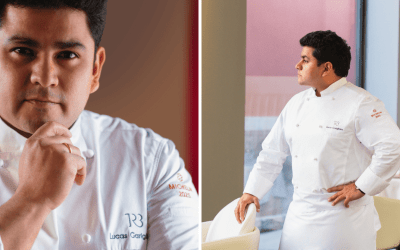Choosing to pursue a Master’s degree is a significant step in any career path, but in hospitality, it can be especially transformative. A Master’s program offers specialized skills, access to leadership roles, and a deep understanding of the complexities of the industry. However, with the investment in both time and finances, it’s important to assess whether this advanced degree is the right move for you.
To guide you through this decision, we spoke with Mr. Rodolphe Bardot, Director of MSc Programs at FERRANDI Paris, one of the most prestigious hospitality schools in the world. Drawing from his extensive experience, Bardot shared insights into the factors students should consider when evaluating the value of a Master’s degree, the skills and career advantages it provides, and how to determine if it aligns with your long-term goals in hospitality.
1. What factors should students consider when deciding whether a Master’s degree aligns with their long-term career goals?
When considering a Master’s degree, the first thing to reflect on is where you want your career to go in the next five to ten years. Do you envision yourself in high-level leadership or Management positions? In hospitality, certain roles—such as hotel or restaurant general manager, director of operations, or hospitality consultant—often require advanced education to reach the top. A Master’s degree equips you with strategic thinking and leadership abilities, making you well-prepared to oversee complex operations, manage teams, and contribute to the financial health of your organisation.
Moreover, a Master’s program uniquely focuses on long-term planning and decision-making. You will learn to analyse markets, manage financial resources, and align operational goals with broader business strategies. If your goal is to take on higher-level responsibilities and have a hand in shaping your company's future, then pursuing a Master’s degree could be a wise investment.
Researching the program’s curriculum is crucial to ensure it covers key areas that match your interests. Look for courses in financial management, marketing, human resources, and leadership. A well-rounded program will give you a broad skill set that is adaptable across various sectors within hospitality.
2. Could you elaborate on the skills and knowledge gained during a Master’s program that are particularly valuable for prospective employers?
The skills developed during a Master’s program are designed to prepare students for the complexities of senior roles. First and foremost, analytical skills are a significant focus. You’ll learn to conduct research, analyse data, and draw insights that inform business decisions. This analytical ability is crucial for understanding market trends and creating strategic plans that lead to growth and innovation in hospitality businesses.
Interpersonal and leadership skills are another significant component. Working on group projects and case studies, you’ll gain experience managing teams, resolving conflicts, and collaborating with diverse personalities. These soft skills are as critical as technical knowledge in hospitality, where customer service and employee management are central to success.
Additionally, organisational skills like time management and project management are honed through the coursework. You’ll also improve your verbal and written communication skills, which are essential when leading teams or presenting business strategies to stakeholders. Employers value these competencies because they translate directly into effective leadership in a business environment.
3. To what extent is a Master’s degree considered a requirement or a significant advantage in the hospitality industry today? How do you see this changing in the future?
In today’s competitive job market, more and more employers in the hospitality industry are prioritising candidates with advanced degrees. While experience is important, a Master’s degree is often seen as a requirement for leadership positions. The degree demonstrates that you have the technical know-how and the strategic insight to lead in a fast-paced, global industry.
Looking at future trends, the demand for advanced degrees in hospitality is likely to grow. The industry is constantly evolving due to technological advancements, shifting consumer preferences, and global challenges like sustainability. A Master’s program that focuses on innovation, digitalisation, and new business models will ensure you stay relevant in this ever-changing landscape. As these trends continue, professionals with a deep understanding of these dynamics will be in higher demand, and a Master’s degree will increasingly be a competitive advantage.
4. How does the reputation and alumni network of a Master’s program impact a student’s career opportunities in the hospitality industry?
The reputation of the institution you choose to attend plays a significant role in your career opportunities post-graduation. Schools like FERRANDI Paris, which have established themselves as leaders in hospitality education, offer a high-quality education and an extensive network of alumni who are already successful in the industry. These connections help open doors to internships, job placements, and career advancement.
An institution’s alumni network is invaluable. It gives you access to professionals who have walked the same path and can offer guidance and mentorship. Additionally, many Master’s programs include guest lectures or workshops led by alumni, providing you with insider knowledge and direct connections to industry leaders. A strong network means you’ll be supported throughout your career, whether landing your first management role or navigating a career change.
5. What advice would you give to students who are torn between entering the workforce immediately or continuing their education with a Master’s degree?
If you’re unsure whether to continue your studies or enter the workforce, consider your career goals. If you feel that a Master’s degree will fast-track you to where you want to be in the next five years, it might be worth starting sooner rather than later. However,
gaining work experience before pursuing a Master’s degree can also be beneficial, as it provides real-world context that can enhance your academic experience.
Many students opt to work for a few years, learn about the industry, and then return to school to deepen their expertise. There are also part-time programs available that allow you to gain professional experience while studying, offering the best of both worlds. Ultimately, the decision depends on your personal circumstances, career goals, and how much value you place on furthering your education at this stage.
6. What is your opinion on taking a break to get work experience between a Bachelor’s and a Master’s degree?
Taking time to gain work experience before pursuing a Master’s degree can be highly beneficial. Work experience allows you to approach your studies with a greater sense of purpose and understanding. By the time you return to school, you will have developed a clearer picture of your strengths, interests, and areas where you want to grow, making your academic journey more focused and rewarding.
Additionally, work experience helps you save money and reduce the financial burden of pursuing a Master’s. Having a steady income before returning to school can provide financial stability, allowing you to fully concentrate on your studies. The professional connections you build during this time can also be invaluable, providing mentorship and job opportunities during or after your graduate studies.
7. Are there specific roles within hospitality where having a Master’s degree provides a clear advantage over just work experience?
Yes, many hospitality roles, particularly those in senior management and strategic leadership, require more than just work experience. For example, positions in hotel investment, event management, or food and beverage management often require a deep understanding of financial planning, budgeting, and strategic decision-making—skills that are typically developed during a Master’s program.
A Master’s degree also prepares you for leadership roles, giving you the ability to manage teams, make informed business decisions, and handle the financial aspects of large-scale operations. Moving beyond entry-level or mid-management roles can be more challenging without advanced training. A Master’s degree equips you with the skills and knowledge needed to take on higher-paying and more secure positions in the industry.
8. What are some common misconceptions students have about pursuing a Master’s degree, and how can they avoid making decisions based on these misconceptions?
One common misconception is that a Master’s degree might overqualify you for certain jobs, making it harder to find work. However, employers in hospitality increasingly value advanced education, especially for management and leadership roles. A Master’s degree sets you apart from other candidates and shows a commitment to advancing your career.
Another misconception is that work experience alone is more valuable than formal education. While experience is crucial, a Master’s degree provides specialised knowledge and skills that would take years to acquire through on-the-job training. It also broadens your network and opens up career opportunities that might not be available through experience alone.
About FERRANDI Paris
FERRANDI Paris is a world-renowned institution specialising in hospitality management education. With a strong focus on innovation, leadership, and global perspectives, FERRANDI equips its students with the skills and knowledge necessary to succeed in the ever-evolving hospitality sector. The school’s reputation, extensive alumni network, and strong industry partnerships make it a top choice for aspiring hospitality professionals.




